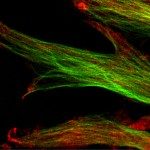Lien vers Pubmed [PMID] – 12003927
J. Bacteriol. 2002 Jun;184(11):2878-88
Catalytic and regulatory domains of the Rel/Spo homolog of Streptococcus equisimilis affecting (p)ppGpp synthesis and degradation activities have been defined, and opposing activities of the purified protein and its fragments have been compared. Two major domains of the 739-residue Rel(Seq) protein are defined by limited proteolytic digestion. In vitro assays of the purified N-terminal half-protein reveal synthesis of (p)ppGpp by an ATP-GTP 3′-pyrophosphotransferase as well as an ability to degrade (p)ppGpp by a Mn(2+)-dependent 3′-pyrophosphohydrolase. Removal of the C-terminal half-protein has reciprocal regulatory effects on the activities of the N-terminal half-protein. Compared to the full-length protein, deletion activates (p)ppGpp synthesis specific activity about 12-fold and simultaneously inhibits (p)ppGpp degradation specific activity about 150-fold to shift the balance of the two activities in favor of synthesis. Cellular (p)ppGpp accumulation behavior is consistent with these changes. The bifunctional N-terminal half-protein can be further dissected into overlapping monofunctional subdomains, since purified peptides display either degradation activity (residues 1 to 224) or synthetic activity (residues 79 to 385) in vitro. These assignments can also apply to RelA and SpoT. The ability of Rel(Seq) to mediate (p)ppGpp accumulation during amino acid starvation in S. equisimilis is absent when the protein is expressed ectopically in Escherichia coli. Fusing the N-terminal half of Rel(Seq) with the C-terminal domain of RelA creates a chimeric protein that restores the stringent response in E. coli by inhibiting unregulated degradation and restoring regulated synthetic activity. Reciprocal intramolecular regulation of the dual activities may be a general intrinsic feature of Rel/Spo homolog proteins.

